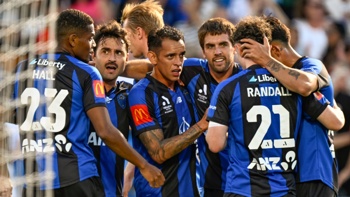A helicopter pilot told investigators he didn’t hear a pilot on the ground announce he was taking off before the fatal collision of their aircraft at an Australian theme park, according to the preliminary report released on Tuesday.
The investigators said they haven’t ruled out the routine radio call being made by the other pilot, however, and plan to investigate further.
The two Sea World helicopters collided during scenic flights on January 2 at the tourist city of Gold Coast near Brisbane.
The incoming pilot, Michael James, managed to land his damaged craft after the collision and save those on board, but the other helicopter broke apart in midair and crashed into shallow water. The departing pilot and three of his passengers were killed, and nine people were injured.
Four New Zealanders - Elmarie Steenberg, Riaan Steenberg, Marle Swart and Edward Swart - were on board the helicopter that pilot Michael James managed to land and were among the injured.
The Australian Transport Safety Bureau report found that as James returned from his five-minute flight, he saw six passengers being loaded onto the second Eurocopter helicopter. But his assessment was that he would be clear of the craft and it would pass behind him.
The aftermath of the Gold Coast helicopter crash. Photo / Supplied, Sandy Trigg
James told investigators that as he came into land, he didn’t see the other helicopter departing and was focused on the landing site and on managing the downwash of his rotors to avoid a pleasure boat crossing through the approach path.
Two passengers spotted the rising helicopter and tried to verbally and physically warn James, the investigators found, but James never saw the other helicopter. The helicopters collided 23 seconds after the second craft lifted off at a height of about 130 feet.
Elmarie and Riaan Steenberg and Edward and Marle Swart were on vacation in Queensland when the Sea World helicopter they were in collided with another on January 2. Photo / Supplied
“The investigation will look closely at the issues both pilots potentially faced in seeing the other helicopter,” said Angus Mitchell, the chief commissioner at the safety bureau.
James and two passengers on the incoming helicopter were seriously injured by glass when the windshield shattered, while the remaining three passengers suffered minor injuries.
On the outbound helicopter, those killed were pilot Ashley Jenkinson, British couple Ron and Diane Hughes, and Sydney woman Vanessa Tadros. The other three passengers suffered serious injuries.
Ten-year-old Nicholas Tadros, the son of Vanessa Tadros, was initially in a coma and remains hospitalised after part of his leg was amputated last week.
/cloudfront-ap-southeast-2.images.arcpublishing.com/nzme/WBPFHR46YND5TLN26R73BS6OIA.png)
Nicholas Tadros, 10, remains in hospital after the mid-air helicopter collision that killed four people, including his mother. Photo / Facebook
Mitchell said the investigation would also examine the use of traffic collision avoidance systems, which pilots reported were installed but not fully integrated into the helicopters that collided, and were of limited use near helipads or while manoeuvring.
James told investigators he didn’t hear any alert from the system before the collision.
Mitchell noted there was no requirement for the helicopters to be equipped with such a system.
He said the survivors and the families of those killed “want to not only understand how the tragedy unfolded, but equally, and most importantly, why it occurred. And why didn’t the safety equipment, processes and procedures that are designed to prevent an accident like this work on this occasion?”
A final report from the safety bureau, one of several investigations into the accident, is expected to take at least another 18 months to complete. - AP
Take your Radio, Podcasts and Music with you

/cloudfront-ap-southeast-2.images.arcpublishing.com/nzme/5FK6TDEYTNDGJH3WQIH2O7STBY.JPG)
/cloudfront-ap-southeast-2.images.arcpublishing.com/nzme/YVCXOVDCABAD5NRSWUOLCUMI2Y.JPG)








